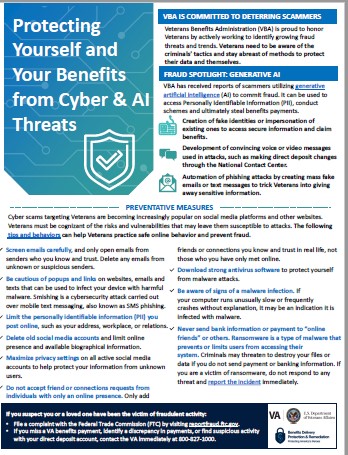VBA IS COMMITTED TO DETERRING SCAMMERS
Veterans Benefits Administration (VBA) is proud to honor Veterans by actively working to identify growing fraud threats and trends. Veterans need to be aware of the criminals’ tactics and stay abreast of methods to protect their data and themselves.
FRAUD SPOTLIGHT: GENERATIVE AI
VBA has received reports of scammers utilizing generative artificial intelligence (AI) to commit fraud. It can be used to access Personally Identifiable Information (PII), conduct schemes and ultimately steal benefits payments.
Creation of fake identities or impersonation of existing ones to access secure information and claim benefits.
Development of convincing voice or video messages used in attacks, such as making direct deposit changes through the National Contact Center.
Automation of phishing attacks by creating mass fake emails or text messages to trick Veterans into giving away sensitive information.
PREVENTATIVE MEASURES
Cyber scams targeting Veterans are becoming increasingly popular on social media platforms and other websites. Veterans must be cognizant of the risks and vulnerabilities that may leave them susceptible to attacks. The following tips and behaviors can help Veterans practice safe online behavior and prevent fraud.
Screen emails carefully, and only open emails from senders who you know and trust. Delete any emails from unknown or suspicious senders.
Be cautious of popups and links on websites, emails and texts that can be used to infect your device with harmful malware. Smishing is a cybersecurity attack carried out over mobile text messaging, also known as SMS phishing.
Limit the personally identifiable information (PII) you post online, such as your address, workplace, or relations.
Delete old social media accounts and limit online presence and available biographical information.
Maximize privacy settings on all active social media accounts to help protect your information from unknown users.
Do not accept friend or connections requests from individuals with only an online presence. Only add friends or connections you know and trust in real life, not those who you have only met online.
Download strong antivirus software to protect yourself from malware attacks.
Be aware of signs of a malware infection. If your computer runs unusually slow or frequently crashes without explanation, it may be an indication it is infected with malware.
Never send bank information or payment to “online friends” or others. Ransomware is a type of malware that prevents or limits users from accessing their system. Criminals may threaten to destroy your files or data if you do not send payment or banking information. If you are a victim of ransomware, do not respond to any threat and report the incident immediately.
If you suspect you or a loved one have been the victim of fraudulent activity:
- File a complaint with the Federal Trade Commission (FTC) by visiting reportfraud.ftc.gov.
- If you miss a VA benefits payment, identify a discrepancy in payments, or find suspicious activity with your direct deposit account, contact the VA immediately at 800-827-1000.


